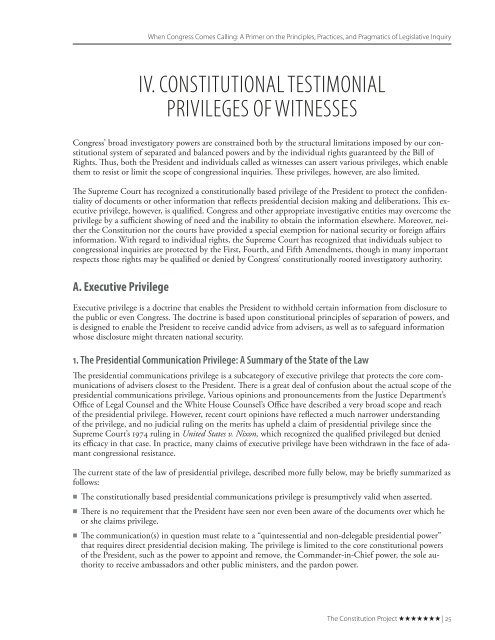When Congress Comes Calling
WhenCongressComesCalling
WhenCongressComesCalling
You also want an ePaper? Increase the reach of your titles
YUMPU automatically turns print PDFs into web optimized ePapers that Google loves.
<strong>When</strong> <strong>Congress</strong> <strong>Comes</strong> <strong>Calling</strong>: A Primer on the Principles, Practices, and Pragmatics of Legislative Inquiry<br />
IV. Constitutional Testimonial<br />
Privileges of Witnesses<br />
<strong>Congress</strong>’ broad investigatory powers are constrained both by the structural limitations imposed by our constitutional<br />
system of separated and balanced powers and by the individual rights guaranteed by the Bill of<br />
Rights. Thus, both the President and individuals called as witnesses can assert various privileges, which enable<br />
them to resist or limit the scope of congressional inquiries. These privileges, however, are also limited.<br />
The Supreme Court has recognized a constitutionally based privilege of the President to protect the confidentiality<br />
of documents or other information that reflects presidential decision making and deliberations. This executive<br />
privilege, however, is qualified. <strong>Congress</strong> and other appropriate investigative entities may overcome the<br />
privilege by a sufficient showing of need and the inability to obtain the information elsewhere. Moreover, neither<br />
the Constitution nor the courts have provided a special exemption for national security or foreign affairs<br />
information. With regard to individual rights, the Supreme Court has recognized that individuals subject to<br />
congressional inquiries are protected by the First, Fourth, and Fifth Amendments, though in many important<br />
respects those rights may be qualified or denied by <strong>Congress</strong>’ constitutionally rooted investigatory authority.<br />
A. Executive Privilege<br />
Executive privilege is a doctrine that enables the President to withhold certain information from disclosure to<br />
the public or even <strong>Congress</strong>. The doctrine is based upon constitutional principles of separation of powers, and<br />
is designed to enable the President to receive candid advice from advisers, as well as to safeguard information<br />
whose disclosure might threaten national security.<br />
1. The Presidential Communication Privilege: A Summary of the State of the Law<br />
The presidential communications privilege is a subcategory of executive privilege that protects the core communications<br />
of advisers closest to the President. There is a great deal of confusion about the actual scope of the<br />
presidential communications privilege. Various opinions and pronouncements from the Justice Department’s<br />
Office of Legal Counsel and the White House Counsel’s Office have described a very broad scope and reach<br />
of the presidential privilege. However, recent court opinions have reflected a much narrower understanding<br />
of the privilege, and no judicial ruling on the merits has upheld a claim of presidential privilege since the<br />
Supreme Court’s 1974 ruling in United States v. Nixon, which recognized the qualified privileged but denied<br />
its efficacy in that case. In practice, many claims of executive privilege have been withdrawn in the face of adamant<br />
congressional resistance.<br />
The current state of the law of presidential privilege, described more fully below, may be briefly summarized as<br />
follows:<br />
33 The constitutionally based presidential communications privilege is presumptively valid when asserted.<br />
33 There is no requirement that the President have seen nor even been aware of the documents over which he<br />
or she claims privilege.<br />
33 The communication(s) in question must relate to a “quintessential and non-delegable presidential power”<br />
that requires direct presidential decision making. The privilege is limited to the core constitutional powers<br />
of the President, such as the power to appoint and remove, the Commander-in-Chief power, the sole authority<br />
to receive ambassadors and other public ministers, and the pardon power.<br />
The Constitution Project | 25


